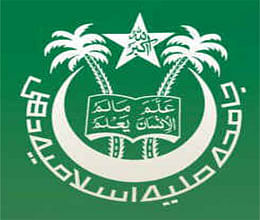
http://jmi.ac.in/studyatjamia/examcontroller/controller/faculty-members
Academic Calendar:
http://jmi.ac.in/bulletinboard/academic-calendar/where-examinations-are-based-on-annual-system
Admission Notification :
http://jmi.ac.in/studyatjamia/admissionandnotification/latest/1
Announcement :
http://jmi.ac.in/bulletinboard/announcements/latest
Fellowships and Scholarships :
http://jmi.ac.in/studyatjamia/scholarshipandfellowships/fellowships
e-Learning Resources :
http://jmi.ac.in/studyatjamia/learningresources/1
University Placement Cell:
http://jmi.ac.in/studyatjamia/cell/upc/introduction
Form & Proforma :
http://jmi.ac.in/studyatjamia/proforma/latest/1
Contact Persons :
Dr S. M. Sajid
Vice Chancellor
011-26984650
ssajid@jmi.ac.in
Prof. Zahid Hussain Khan
Registrar
011-26981195
Mr. Mohd. Inam Qadir
ASSTT. CONTROLLER OF EXAMS
011-26980337
Dr Khalid Iftikhar
Controller of Examinations
Phono No.+91-11-26329165, 26981717
Ext No: 1400
Fax: +91-11-26329165
Email: controllerexaminations@jmi.ac.in, kiftikhar@jmi.ac.in
Dr Mohd. Ishaq
Deputy Controller of Examinations
Phono No.26981717
Ext No: 1450
Email: mishaque@jmi.ac.in
Mr Jitender Singh | Assistant Registrar
Phono No.26847078, 26981717
Ext No: 1410
Email: jsingh@jmi.ac.in
Communication Address :
Jamia Nagar
City : New Delhi
Pincode : 110025
State : Delhi
Phone : 011-26980337
About :
Jamia Millia Islamia, an institution originally established at Aligarh in United Provinces, India in 1920 became a Central University by an act of the Indian Parliament in 1988. In Urdu language, Jamia means ‘University’, and Millia means ‘National’.
The story of its growth from a small institution in the pre-independence India to a central university located in New Delhi—offering integrated education from nursery to research in specialized areas—is a saga of dedication, conviction and vision of a people who worked against all odds and saw it growing step by step. They “built up the Jamia Millia stone by stone and sacrifice by sacrifice,” said Sarojini Naidu, the nightingale of India.
Under the colonial British rule, two dominant trends joined hands and contributed towards in the birth of Jamia. One was the anti-colonial Islamic activism and the other was the pro-independence aspiration of the politically radical section of western educated Indian Muslim intelligentsia. In the political climate of 1920, the two trends gravitated together with Mahatma Gandhi as a catalyst. The anti-colonial activism signified by the Khilafat and the pro-independence aspirations symbolised by the non-cooperation movement of the Indian National Congress helped to harness creative energies and the subsequent making of Jamia Millia Islamia. Rabindranath Tagore called it “one of the most progressive educational institutions of India”.
Responding to Gandhiji’s call to boycott all educational institutions supported or run by the colonial regime, a group of nationalist teachers and students quit Aligarh Muslim University, protesting against its pro-British inclinations. The prominent members of this movement were Maulana Mehmud Hasan, Maulana Mohamed Ali, Hakim Ajmal Khan, Dr. Mukhtar Ahmad Ansari, and Abdul Majid Khwaja.










